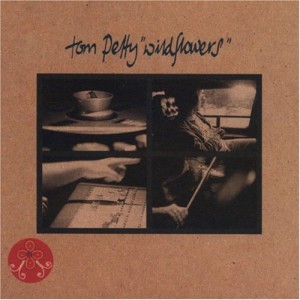
Tom Petty's Second Solo Album, "Wildflowers" (1994) Was Produced By Rick Rubin, With Michael Kamen Adding Many Orchestrations.
Tom Petty’s second solo album is clearly a more modest effort than his previous solo offering (“Full Moon Fever“, issued in 1989). This time around there are no superstars backing Mr. Integrity (fellow Traveling Wilburys Roy Orbison, Jeff Lynne and George Harrison had contributed substantially to the making of “Full Moon Fever”), and “Wildflowers” was to end up sandwiched between two of Tom Petty & The Heartbreakers better releases: “Into The Great Wide Open” (1991) and the tragedy-inspired “Echo” (1999). If anything, “Wildflowers” seems to me a canvass upon which “Echo” was to be painted. In some cases, a couple of brushes have already been either insinuated or put into place in “Wildflowers” – the songs “Crawling Back To You” and “Don’t Fade On Me” constitute a true link in the chain of despondency and abatement that would come to define the most endemic material to “Echo” (“Rhino Skin”, “One More Day, One More Night”).
By my reckoning, there are only a handful of tracks here that are real keepers. These include “Time To Move On” and “A Better Place”, both reasonably upbeat (or at the very least positive) compositions, and the relatively loud “Honey Bee”, a number in which Tom and Mike Campbell have one of their best guitar duels on record with the instrument of each having a separate speaker all to itself.
The three-chord rocker “You Wreck Me” was a successful single, and so was the mellow, autobiographical “It’s Good To Be King” . I think they are good, but not that good. I wouldn’t call “You Wreck Me” rote, but I would call it perfunctory. And when I listen to “It’s Good To Be King” I get the feeling Petty is holding something back – something he would unleash to good effect on “Echo”, and to disastrous consequences on “The Last DJ”. In the end, Michael Kamen’s orchestral arrangement is what makes this rumination on fame remotely memorable.
The folksy contingent of the album is best-represented by the title track, which is a lovely air and one of Petty’s most realized incursions in the genre. Conversely, cuts like “To Find A Friend” are easy to listen to, but also easy to be forgotten.
The final track (“Wake Up Time”) also points the way into “Echo”, with its study of the harshness of reality and the harrowing realization of failing to come to terms with it. And Tom playing the piano is a really nice surprise, too.
“Wildflowers” was to be Petty’s first full-length collaboration with legendary producer Rick Rubin, and if I am not mistaken this was also the first time Steve Ferrone would act as Petty’s studio drummer after Stan Lynch’s sudden departure.
“Wildflowers” is not a bad CD in any sense of the word, it is just that it has trouble acquitting itself in the presence of the albums either side of it. Still, the album let Petty consolidate one of the best creative alliances he had ever made (Rick Rubin; he had produced “Mary Jane’s Last Dance” for the “Greatest Hits” album) and some of the strongest records of his career with the Attractions were just around the corner.
Rating: 6.5/10

Pingback: Echo (Tom Petty) – Album Review | MusicKO